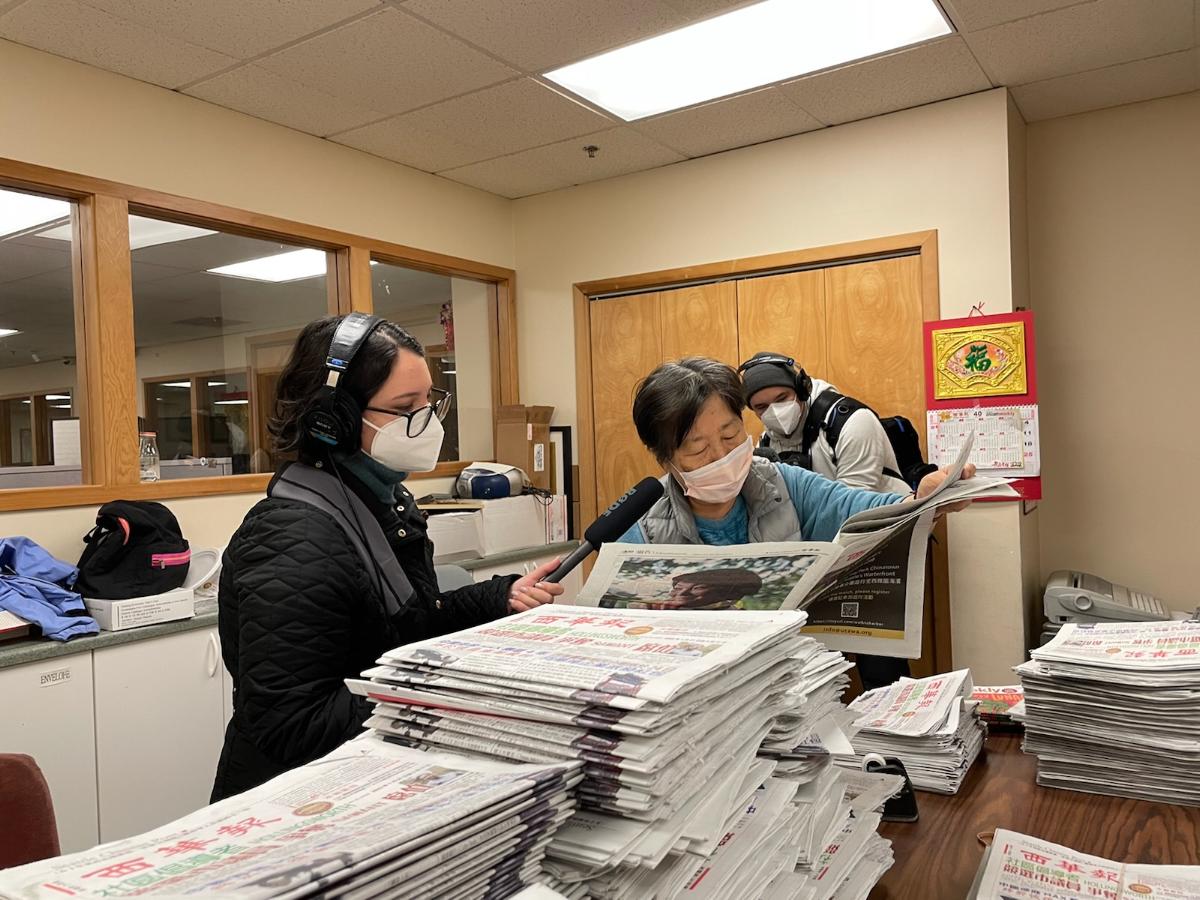By Mahlon Meyer
NORTHWEST ASIAN WEEKLY
The Chinese commentator, Old You, broadcasts from his home on YouTube every day—about such topics as how much President Joe Biden earns per year. Old You—or Lao You, as he’s referred to in Mandarin—almost always ends his broadcasts with a shake of the head about America, a country that seems to hold the antithesis of Chinese values.
Such broadcasts, coming from the PRC, and watched by Chinese people living there, might not be surprising.
But these days, the broadcasts of Old You (pronounced “Yo”) appear to be a major news source about this country for many residents of Seattle’s Chinatown-International District (CID).
Such a development is just one of the many changes wrought by the closing of the neighborhood’s Chinese-language newspaper, the Seattle Chinese Post (SCP), over a year ago.
 At the same time, the lack of a credible news source that focuses on the community has altered local politics. It may have cost Seattle City Councilmember Tanya Woo her chance at an elected seat last year.
At the same time, the lack of a credible news source that focuses on the community has altered local politics. It may have cost Seattle City Councilmember Tanya Woo her chance at an elected seat last year.
Meanwhile, other news sources are struggling to gain a foothold.
Loss of unity
The SCP, founded in 1982 to replace a neighborhood bulletin board, soon came to take on a much broader role in the community. It was the first Chinese newspaper in the Pacific Northwest since 1927.
The SCP moved from a forum of five pages for local news and news briefs, classified ads, and community announcements to a vital source of news including eight pages of local and national news as well as five pages of international news including China, Taiwan and Hong Kong for immigrants and non-English speaking residents. It also played a crucial role in coalescing political power for the AAPI community in the region.
When it closed, the community lost a vital source of unity.
While the CID has a long history of rival language groups and varying dialects, anyone from anywhere in China could read the newspaper.
When it closed, due to inevitable rising costs and the owners’ retirement, the impact was immediate.
A mobilizing voice
While the SCP was still around, it played vital roles in political movements. Most recently, it played a key role in spreading word about ongoing rallies against Sound Transit’s plans to build a hub in the center of the community—dooming it to a decade of construction and probable extinction. The transit authority’s board decided to move the proposed station.
During subsequent rallies against the county’s plans for a massive homeless shelter next to the CID—although a dozen shelters were already in the area and violence engulfed the neighborhood—the SCP reported on individual immigrants who came out to speak at rallies. This encouraged them to speak at public forums, such as the Seattle City Council. It also helped coordinate efforts by community advocates to rally hundreds of senior citizens. The county eventually moved the shelter.
The first fatality
When the SCP closed in January of 2023, it left a vacuum. Woo, for instance, had long been an advocate for both the homeless and for public safety in the CID. She had helped lead the recent protests.
But when she ran for the Seattle City Council late last year, she was the first fatality of that vacuum. Her decision to run for office was announced weeks after the SCP shutdown.
“You used to go to Hing Hay Park and see all the seniors reading the paper,” Woo told the Northwest Asian Weekly. “It was a community voice. It was how we found out about important events. Not having that has been really tough to bring the community together.”
Woo lost by 403 votes but was later appointed to an open position.
SCP had 1,500 copies in distribution in Woo’s district 2, including mail subscriptions and distribution to family associations, community organizations, grocery stores and other small businesses including areas such as the CID, Beacon Hill, and Rainier Beach.
No common currency
Szeto Hung, the inaugural editor of the newspaper, said the impact of the closing of the SCP was drastic.
“The SCP was a comprehensive newspaper with weekly local, American and international news and analysis. After the suspension of publication, readers lacked social news and general knowledge,” he said.
With it gone, the public has largely lost awareness of community activities—and participation in them has dried up.
Meanwhile, the loss of advertisement has not only reduced the attraction for community participation. It also reduced consumption of community businesses. Several small businesses, which had used classified ads to bolster sales, have complained about a lack of calls and lack of venues to market their products.
Moreover, the SCP remedied a lack of understanding about the implementation of government laws.
“Consequently, there is a lack of consensus among the Chinese community, and thus, there are few topics for small talk and community interaction.”
To some observers, the entire Chinese society in this area appears to be regressing and lacks a driving force to move forward. Although many community leaders came out to support Woo, their presence at banquets or rallies did not draw the entire community—or come close to the thousands of copies of the SCP that were distributed by subscription, picked up in popular locales, or read online.
“What was lacking was a single print medium that reached everyone, as in the old days,” said Nancy Chang, the former editor of the SCP, in an interview.

KUOW interviewed Nancy Chang, Seattle Chinese Post features editor, on Jan. 19, 2023. (Photo by Assunta Ng)
Repercussions
Today, as Woo gears up for another run, the impact remains. It may have gotten worse.
“Many people don’t even know who Tanya is,” said Beth Ku, an informal community organizer, using Woo’s Chinese name. “They think she’s from the Philippines or another district. They don’t know her family is from here, what they all did for the community, or the ways she’s stood up for the community.”
Searching for community focus
A local TV station once carried news in Cantonese some years ago, Ku said. But after a change in ownership, they apparently stopped broadcasting.
Other newspapers in Chinese include one sponsored by a Buddhist association and another allegedly with ties to Falun Gong, the banned religious sect, or cult, originally from China.
Readers say that the latter is so full of dark news about China, it’s hard to read consistently.
Another Chinese-language newspaper, the Seattle Chinese Times, publishes monthly and does not appear to have a reporter covering the community, relying heavily on translated material from other Chinese websites from different parts of the country. The other one is Seattle Chinese News, which also lacks local mainstream news.
Still another Chinese-language news source, “Meiguo Xiyatu Xinwen,” or “SeattleCH,” also appears to be published infrequently and devoid of community news.
Hearsay
In the absence of a bona fide weekly Chinese-language community newspaper, information has had to be shared first-hand.
For instance, Ku said she had to meet Woo personally to change her mind about her—and become a supporter.
Prior to that, she believed Woo spent so much time in homeless encampments, handing out food and clothing, that she was no different than others in Seattle who cared more for people living in tents than the longtime residents of the neighborhood.
Moreover, without the SCP, Ku read stories in Chinese-language newspapers from California about people experiencing homelessness. They seemed to confirm her worst fears.
“I remember reading an article about a homeless man who said he could get thousands of dollars a month from welfare. He didn’t want to pay rent and lived in a tent and liked his freedom. He would spend his days lying in the sun on the beach and eat lobster for dinner,” she said.
Oral news
But when Ku was invited to join the CID Public Safety Council, she met Woo in person.
“I learned that she was willing to stand up for public safety for the community,” she said.
Very few people understand the extent of the violence she and others have been exposed to in the CID, Ku said.
“I never know when I’m going to be attacked,” she said. “And not everyone is willing to call 911.”
A new beginning?
After the shuttering of the SCP, a small group of activists tried to form another Chinese-language newspaper.
But efforts fell apart after about three months, according to several involved.
Eventually, the publisher of the SCP, Assunta Ng, gifted the newspaper to the Asia Pacific Cultural Center. It restarted online.
But a review of its content shows that, in keeping with the mission of its new publisher, it seems to focus mostly on statewide news and less on local news.
In the meantime, a small newsletter in Chinese has started to circulate among the community.
Comprising only a single page, it covers community news, but only the most pragmatic items, such as road closures or health issues.
A volunteer used to drop it off at residential buildings and restaurants until she recently grew sick, said the publisher, Peiyi Cheng. Now, the newsletter is dropped at Uwajimaya.
The volunteer team emails it to community organizations, such as Chinese Information and Service Center and Kin On. A local Chinese-language school is planning to help with the distribution.
Cheng is looking for more volunteers and for outside funding to expand coverage.
Mahlon can be reached at info@nwasianweekly.com.




We subscribed the Seattle Chinese Post for over forty years. Every week we looked forward to receive the SCP in the mail. The AAT TV channel stopped broadcasting on the UHF TV Channel and the SCP was the last regular connection we had with the the Chinese community in Seattle. Since the Seattle Chinese Post ceased publishing the weekly news paper, we really miss reading in Chinese about the activities and events in Chinatown..
Benjamin Eng, Jr.
360-691-1839